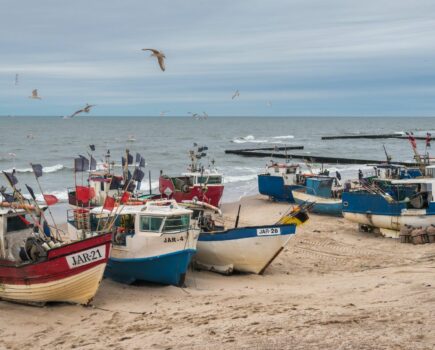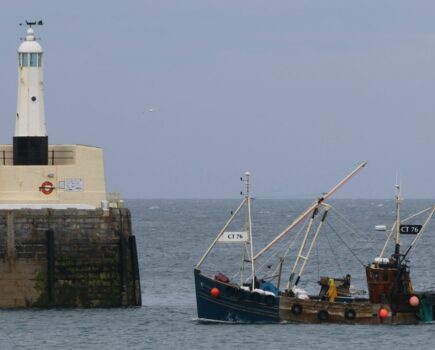The government is intent on a reckless ‘gung-ho’ approach to the implementation of MPAs in English waters that will lead unavoidably to serious displacement of fishing activities, reports Tim Oliver.
But there is no policy to deal with the displacement, and its consequences.
This is the view of the NFFO in an excoriating document that warns of a fundamental change in government attitude towards fishing activities in MPAs in English waters.
The federation has previously warned of a rush to implement measures in 40 MPAs without any industry consultation, and says it will now need to adopt a different approach.
It says the appointment of former fisheries minister Richard Benyon as DEFRA minister in the House of Lords has ‘prompted a rethink’ of its approach to the management of MPAs. Lord Benyon was the author of a controversial and one-sided report on highly protected marine areas that aroused fury in the industry when it was published in 2020.
The federation says the government’s approach to managing MPAs has changed from one based on evidence to ‘one with more resemblance to a bulldozer’. This, and now the appointment of Lord Benyon, means that the NFFO’s previous approach of challenging the government over MPAs is pointless, and it must now focus on the displacement effects of government policy.
“There is only one question now,” says the federation. “What is government policy towards the many hundreds of fishermen who will now be displaced from their fishing grounds?
“In English waters, DEFRA/MMO’s intention is to introduce management measures for 40 offshore MPAs over the next three years – an insanely rushed approach that will leave no time for careful consideration, collation of evidence or dialogue.
“Inshore, the picture is worse. Inshore vessels tend to have more limited range, and IFCAs are already overwhelmed by the task of implementing MPAs within the six-mile limit. Sixty percent of their activities now relate to MPAs.”
It says discussion with the industry on how to achieve the conservation aims of each MPA has been abandoned in England – in contrast to Scotland, which remains committed to a measured policy on implementing MPAs that minimises the impact on fishing.
The appointment of Lord Benyon as a minister means there will be no return to dialogue, evidence and collaboration, says the federation. “DEFRA ministers are not going to go against the recommendations made by one of their number. Only questions relating to displacement remain.”
These, it says, are:
- What will be the scale of displacement effects as vessels are forced off their grounds in a kind of marine Highland Clearance?
- What is the government’s policy to deal with the social, economic and environmental fallout of the new approach?
- How does this fit with the government’s ‘levelling up’ agenda?
“At present, there is no policy on displacement. There is a void. Silence. Nothing has been done to assess the extent of displacement. Nothing has been done to mitigate displacement. Nothing has been done to assure the fishing industry that its interests will be seriously taken into account or its views listened to,” says the federation.
It points out that Lord Benyon ‘led the charge’ on implementing the landing obligation when he was fisheries minister and ‘taking the green glory’.
It says the new approach is in ‘flat contradiction’ to the Fisheries Act, which says fisheries policy should be science-based.
“The new DEFRA policy on MPAs represents another violation of trust between the government and the fishing industry,” says the NFFO.
“Marine conservation zones (MCZs) in English waters were designated on the explicit understanding that they would not be automatically closed to fishing.
“Assurances were made verbally and in writing that the social and economic impacts on the fishing industry would be front and centre in shaping management approaches that would achieve conservation objectives without unnecessary harm. Those assurances and commitments have been left behind, like so much offal.
“It is inconceivable that the fishing industry would have agreed to the designation of MCZs on the current scale had it been told honestly that these would be closed areas for fishing. A whole consultative exercise stretching over several years has been rendered null and void.”
New era
The federation concludes that the industry has entered ‘a new era’, with no meaningful discussion on MPAs and displacement of fishing activities ‘on a huge scale’.
It says efforts now must be focused on ‘forcing the government to face up to the consequences of its policies’. Ministers must explain:
- What work has been done to assess the scale of displacement of fishing activities from MPAs?
- What will the cumulative effect of displacement be, when offshore wind and other marine infrastructure are included in the assessment?
- What will the social and economic consequences of displacement be?
- What will the environmental consequences of displacement be outside MPAs?
- How will those whose livelihoods have been impacted be compensated?
“This government is already earmarked to go down in history as Edward Heath Mark II for its betrayal of fishing in the Trade and Co-operation Agreement. A £100m bung will not erase that stain,” it says.
The federation says that the industry is still paying for the consequences of the bungled and damaging landing obligation, and DEFRA ministers are ‘about to embark on a further reckless and harmful policy to harvest the green vote’.
“The bill will be paid by the fishing industry, vessels large and small, and £100m for lost fishing opportunities in perpetuity will be chickenfeed.” But more damaging than the financial and economic impact will be ‘the erosion of the fabric of our industry’, it says.
“Once a key component in the food security and cultural understanding of itself as a nation, fishing is being steadily relegated and displaced,” warns the NFFO.
“Other national priorities, such as a trade deal with the EU and the development of offshore wind farms, take precedence. A reckless approach to MPAs is just another thing on the list. There will be a reckoning, but by then the damage will have been done.”
The federation acknowledges that MPAs have a role to play in marine protection, and that evidence from elsewhere in the world suggests they can co-exist with fishing where there is dialogue based on sound science.
Carefully designed and implemented MPAs can play ‘an absolutely essential protective role’, but ‘what is missing in the new DEFRA approach is a sense of balance or appreciation of the trade-offs necessary to achieve the best overall outcomes’.
It says that while it does not believe it is government policy to ‘force fishermen out of their communities and homes to make way for second-home owners’, that will be the effect. It also questions how its MPAs policy is compatible with its alleged ‘levelling up’ agenda.
The repercussions of the government’s ‘volte-face’ will be ‘profound’, says the federation.
“Aside from the consequences for individual fishing businesses and fishing communities, as the noose tightens on the inshore and offshore sectors, conflict and adversarial relationships can be expected to replace co-operation and collaboration.
“Competition for space, already intense in some areas, will become acute. The MMO and IFCAs will become enforcers – the equivalent of bailiffs – rather than be enabling and facilitating regulators. The concept of co-management will remain on the drawing board rather than the aspirational lodestar that we had hoped for.”
DEFRA was approached for comment, but had not responded as Fishing News went to press.
The full document can be seen on the NFFO website at: bit.ly/3eXDJRc
This story was taken from the latest issue of Fishing News. For more up-to-date and in-depth reports on the UK and Irish commercial fishing sector, subscribe to Fishing News here or buy the latest single issue for just £3.30 here.








